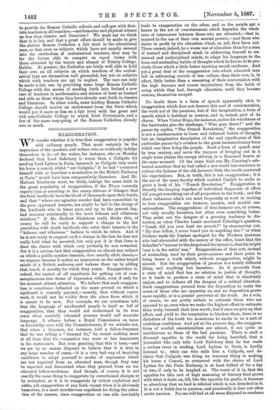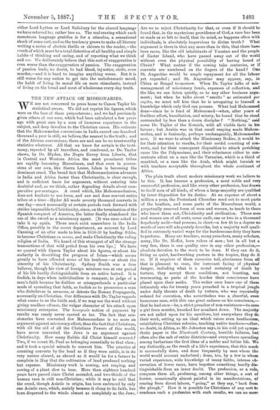EXAGGERATION.
WE wonder whether it is trne that exaggeration is popular with ordinary people. That must certainly be the impression of the speakers and writers who so recklessly indulge themselves in it,—of the writer, for instance, who on Monday declared that Lord Salisbury is worse than a Caligula for sending Lord Lytton to Paris, inasmuch as Caligula only made his horse a consul, whilst "our Caligula," if he had "contented himself with so harmless a nomination to the British Embassy at Paris," would have been comparatively blameless. And Mr. Herbert Gladstone must, we think, indulge the same faith in the great popularity of exaggeration, if the Times correctly reports him as asserting to the canny citizens of Glasgow that the Irish landlords have the blood of thousands upon their heads, and that " where one agrarian murder had been committed by the poor oppressed tenants, ten might be laid to the charge of the landlords who in times past, and up to the present day, had recourse continually to the most hideous and villainous evictions." If Mr. Herbert Gladstone really thinks this, of course be will be ready to support a change in the law punishing with death landlords who evict their tenants in the " hideous and villainous " fashion to which he refers. And if he is not ready to support such a change in the law, he does not really hold what be asserted, but only put it in that form to draw the cheers with which very probably he was rewarded. For it is a curious fact that exaggeration on almost any subject on which a public speaker descants, does usually elicit cheers,— we suppose because it makes an impression on the rather torpid minds of a British audience, and wakens them up by adding that touch of novelty for which they yearn. Exaggeration is, indeed, the easiest of all expedients for getting out of com- monplaceness into forms of expression which, even if only for the moment, attract attention. We believe that such exaggera- tion is sometimes defended on the same ground on which a signboard is coarsely painted,—namely, that without coarse work, it would not be visible from the place from which it is meant to be seen. For example, we are sometimes told that the language of uneducated people is itself so full of exaggeration, that they would not understand in its true sense what carefully educated persons would call accurate language. A witness before a Royal Commission on taxes on knowledge once told the Commissioners, if we mistake not, that when a drayman, for instance, told a fellow-drayman that he was telling a " damned lie," he meant nothing more at all than that his companion was more or lees inaccurate in his statements. But even granting that this is true,—and we are by no means disposed to believe that it is true in any large number of cases,—it is a very bad way of inspiring confidence to adapt yourself to modes of expression which are not expected from an educated man, though they may be expected and discounted when they proceed from an un- educated fellow-workman. And though, of course, it is not exactly the same thing to exaggerate by overstrained charges or by metaphor, as it is to exaggerate by violent expletives and oaths, yet exaggeration of any kind, except when it is obviously humorous, is a most mischievous expedient for fixing the atten- tion of the masses, since exaggeration on one aide inevitably
leads to exaggeration on the other, and so the people get a lesson in the art of overstatement which degrades the whale tone of intercourse between those who are educated,—that is, trained to the use of their own mental powers,—and those who desire to profit by the education which, as yet, they have not. There cannot, indeed, be a worse use of education than for a man of trained and disciplined mind, in addressing himself to un- trained and undisciplined minds, to adapt his language to the loose and misleading habits of thought which he knows to be pre- cisely those which a little better teaching would eradicate. And yet a great deal of the exaggeration into which educated men fall in addressing crowds of less culture than their own, is, in effect, little better than a seasoning of their conversation with the high flavours and coarse imputations from the habit of using which they had, through education, until they became orators, themselves escaped.
No doubt there is a form of speech apparently akin to exaggeration which does not deserve this sort of condemnation, the work not of the passions, but of the imagination, a form of speech which is habitual in oratory, and is, indeed, part of its charm. When Victor Hugo, for instance, makes his watchman at the barricades give the challenge, " Who goes there P" and the passer-by replies, "The French Revolution," the exaggeration is not a condescension to loose and inflamed habits of thought, but an imaginative description of the real significance of this particular passer-by's relation to the great insurrectionary force which was then firing the people. Such a form of speech may be true oratory, and serve the purpose of bringing out in a single terse phrase the energy stirring in a thousand hearts at the same moment. Of the same kind was Mr. Canning's cele- brated assertion that he had called a new world into existence to redress the balance of the old, however little the result answered his expectations. But, in truth, this is not exaggeration ; it is the use of the same faculty which enabled Carlyle to make so great a book of his " French Revolution." Exaggeration is literally the heaping together of individual fragments of effect till you get something out of all proportion to the truth; and the three influences which are most frequently at work in inciting to true exaggeration are humour, passion, and morbid sen- sationalism. The exaggerations of true humour are, of course, not only usually harmless, but often even something better. They point out the dangers of a growing tendency to dis- tortion, as when Charles Lamb answered Coleridge's question, " Lamb, did you ever heat me preach!'" by stammering out, "My dear fellow, I never heard you do anything else I" or when Dickens made the Yankee apologist for the Western postman who had absconded with the money of the office, boast that the defaulter's "answer to the despot and the tyrant is, that his bright 'ome is in the settin' sun." Exaggerations of that sort, instead of misleading, tend by their grotesqueness and their point to bring home a truth which, without exaggeration, might be missed. But the exaggeration of passion is a totally different thing, and anything but harmless. As it proceeds from a state of mind that has no relation to justice of thought, so it tends to produce a state of mind that is absolutely unjust, and to inflame all the dangers of a critical situation. Such exaggerations proceed from the disposition to make the worst of those who are opposing us, and no disposition grows more rapidly, or is a greater perverter of the truth. As a rule, of course, we are pretty certain to estimate those who are opposed to us, even when we make the highest effort to estimate them truly, beneath their true worth; but if once we give up that effort, and yield to the temptation to blacken them, there is no distortion of the truth too monstrous to excite in us a sort of credulous confidence. And yet at the present day, the exaggera- tions of morbid sensationalism are almost, if not quite as mischievous as those of the bad passions. There is such a diseased appetite in the world for being horrified, that a journalist who only tells Lord Salisbury that he has made a serious error in sending Lord Lytton to Paris, is hardly listened to ; while one who calls him a Caligula, and de- clares that Caligula was doing an innocent thing in making his horse a Consul, as compared with the choice of Lord Lytton for the Paris Embassy, is at least talked of for a day or two, if only to be laughed at. The worst of it is, that the appetite for this sort of high seasoning of literary food grows with what it feeds on, till, like the appetite for garlic, it becomes so absorbing that no food is relished which is not drenched in it. It is not a habit due to passion, and practically it does not often excite passion. No one will feel at all more disposed to condemn
either Lord Lytton or Lord Salisbury for the absurd language we have referred to ; rather less so. The real craving which such monstrous language gratifies is for a stimulus, a sensational shock of some sorkand so the tendency grows to make all literary writing a series of electric thrills or shivers to the reader,—the result of which mast be a total distortion of all healthy and simple habits of thinking and seeing, and of reporting what we think and see. We deliberately believe that this sort of exaggeration is even worse than the exaggeration of passion. The exaggeration of passion leads, no doubt, to bad blood, injustice, strife, even murder,—and it is bard to imagine anything worse. But it is still worse for any nation to get into the melodramatic mood, the habit of living its moral life on mere stimulants, instead of living on the bread and meat of Wholesome every-day truth.



















































 Previous page
Previous page